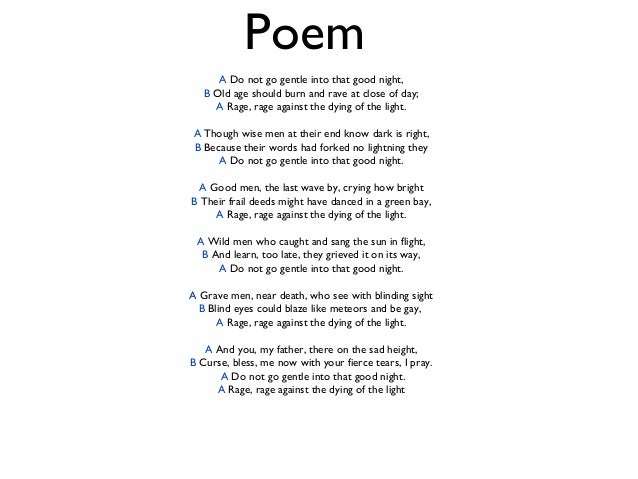

They’ve “forked no lightning,” or failed to create a big burst of light-here a symbol for life-that would give them a legacy. Though he acknowledges that death may be “right”-after all, everyone dies eventually as part of the natural process discussed above-at the beginning of the second stanza, he writes that “wise men” refuse to accept it, because they haven’t yet left enough of an impact on the world. With the similar-sounding words “rave” and “rage,” Thomas emphasizes anger and passionate intensity in the face of death. This generic conception of death is what Thomas's characters in the poem are fighting against, striving to give their deaths individual significance. This gives death an impersonal feel: if everyone and everything dies, there's little that's special or notable about one death. By using this metaphor, he presents life and death as part of the endless natural cycle of time, which began long before our lives and will go on long after them, just as day and night are a part of it. In the first stanza, Thomas uses day and night as an extended metaphor for life and death, urging people to resist death courageously rather than simply accepting it. Finally, the speaker reveals that he is addressing his father, who is dying, and urges him to show emotion, like men he has just described. In their old age, they have a clarity that escaped them when they were younger, now able to "see with blinding sight," or understand things with piercing lucidity. “Grave men,” he continues, realize that they can die dramatically-“blaze like meteors”-by refusing to yield to death. Again, the speaker uses natural imagery, comparing wild men's adventures to the excitement yet ultimate fruitlessness of "ca and s the sun."

The fourth stanza continues this theme as the speaker discusses “wild men,” who spend their lives on futile adventures, failing to appreciate how short life is until they face death, which they refuse to meet calmly. These men, too, fight death in hopes of leaving a lasting legacy. Despite their virtue, their deeds remain "frail" and haven't stood out sufficiently as a strong, massive wave in a calm bay would.

In the third stanza, the speaker adds that “good men,” too, stand against death for similar reasons. The speaker continues to use natural imagery in this second stanza, likening the failure of words to leave a mark on the world to an inability to "fork," or redirect, lightning. He states that “wise men” know that death is ultimately right, but that they nonetheless combat it because they haven’t left enough of a mark on the world. The speaker opens with a command, addressing an unknown listener, to resist dying peacefully and instead to fight hard against death, despite its inevitability, using night and day as metaphors for death and life.


 0 kommentar(er)
0 kommentar(er)
